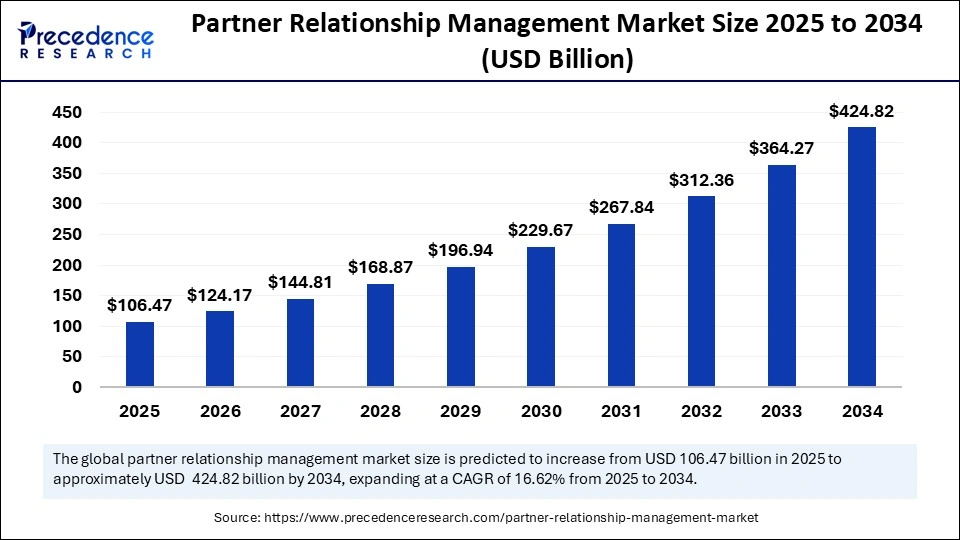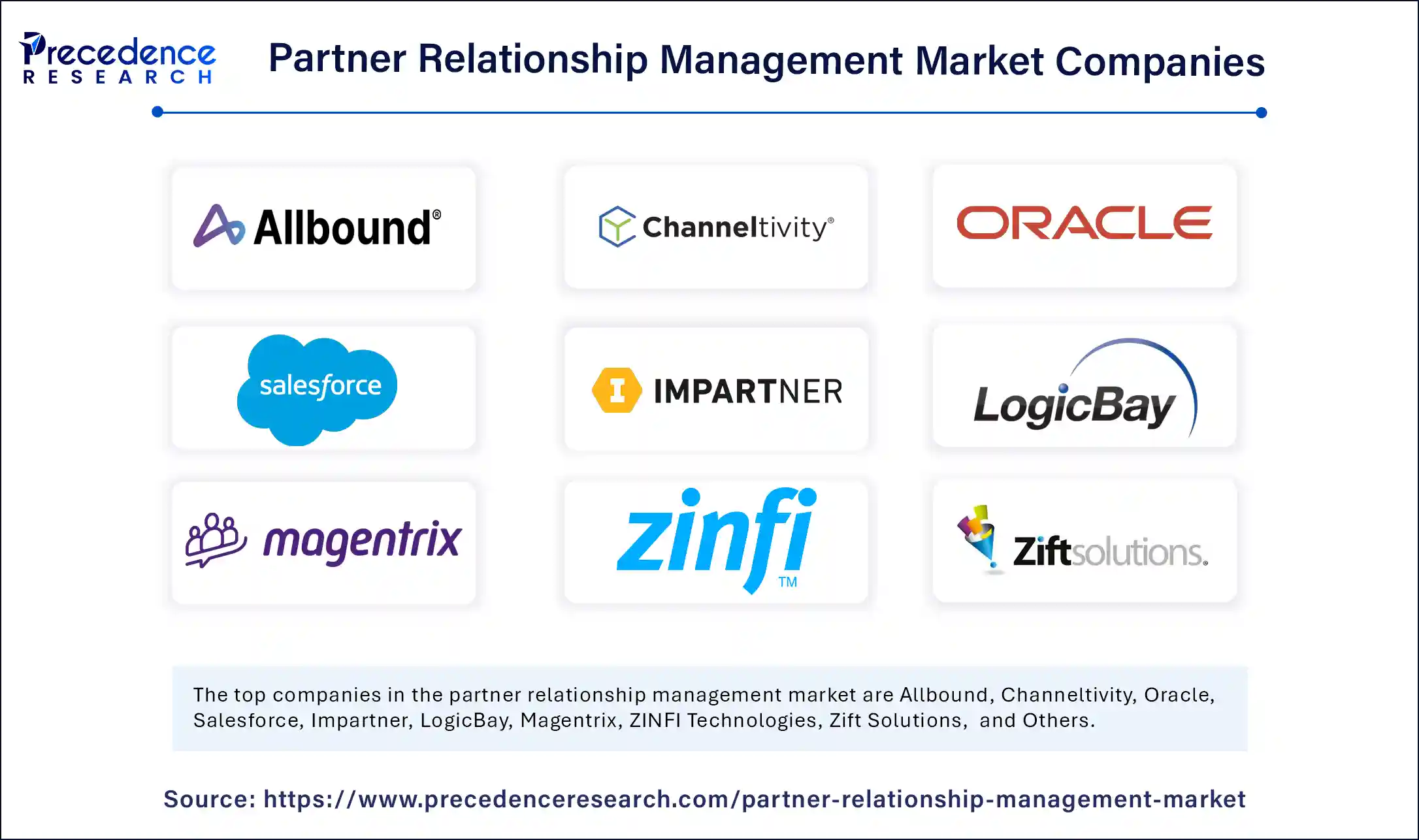
Partner Relationship Management Market Key Points
- North America dominated the market with the highest revenue share of 34% in 2024.
- Asia Pacific is projected to experience the fastest growth over the forecast period.
- Among services, the training and consultation segment accounted for the largest revenue share in 2024,
- while the managed services segment is expected to expand at a notable CAGR from 2025 to 2034.
- In terms of deployment, the cloud segment held the leading share in 2024,
- whereas the on-premise segment is forecasted to grow at a substantial rate during the projection period.
- By organization size, large enterprises led the market in 2024,
- while small and medium-sized enterprises (SMEs) are poised to grow rapidly in the upcoming years.
- Based on application, the IT & telecom segment generated the highest revenue in 2024,
- while the BFSI sector is anticipated to register the fastest growth between 2025 and 2034.
Partner Relationship Management Market Overview
The Partner Relationship Management (PRM) market has become a crucial element of modern enterprise strategy, particularly for organizations that rely on indirect sales channels such as distributors, resellers, managed service providers (MSPs), affiliates, and system integrators. PRM solutions are designed to optimize the way businesses manage their partner ecosystems—offering tools for onboarding, training, lead distribution, co-selling, performance tracking, content sharing, and incentive management. As global supply chains become more intricate and customer journeys more complex, the ability to coordinate and empower partners has become essential for sustaining growth, brand consistency, and customer experience.
The market has evolved from traditional channel management platforms to sophisticated cloud-based PRM systems that integrate with CRM, marketing automation, and ERP tools. These platforms provide a centralized hub for partner communication and engagement, while also delivering real-time visibility into sales metrics, deal registrations, and partner performance. With digital transformation accelerating across industries, the PRM market is seeing increased adoption not only in the tech sector but also in manufacturing, healthcare, financial services, and retail. As ecosystems become more interdependent and partner-centric business models grow, the PRM market is expected to expand rapidly.
Partner Relationship Management Market Growth Factors
Several underlying forces are driving the growth of the PRM market. Chief among them is the shift toward ecosystem-led growth strategies, where companies seek to co-innovate and co-sell with external partners to reach new customers, markets, and solutions. This is especially evident in sectors like SaaS, cloud infrastructure, cybersecurity, and IoT, where no single company can deliver end-to-end value independently. The need to scale operations efficiently without expanding internal sales teams is another strong growth factor, prompting firms to invest in digital tools that empower their partner networks to act as brand ambassadors and revenue generators.
The increasing complexity of indirect sales models—often involving multiple layers of partners, verticals, and geographies—necessitates advanced systems that can streamline partner interactions and measure ROI accurately. Additionally, the rise of subscription-based and recurring revenue models has transformed channel engagement strategies, making continuous partner enablement, customer success, and lifecycle revenue management central to PRM platforms. Lastly, the accelerated adoption of cloud technologies and remote collaboration tools has made cloud-based PRM solutions more accessible and appealing to businesses of all sizes.
Impact of AI on the Partner Relationship Management Market
Artificial Intelligence (AI) is reshaping the PRM market by enabling smarter, more personalized, and data-driven partner engagement strategies. AI-powered PRM platforms can deliver predictive analytics that forecast partner performance, deal success rates, and customer churn, allowing vendors to allocate resources more effectively. By analyzing historical partner data, AI can also automatically segment partners based on potential, specialization, or engagement levels, helping organizations tailor their onboarding, training, and incentive programs accordingly.
In partner onboarding and training, AI-driven chatbots and recommendation engines streamline the learning process by offering adaptive learning paths based on user behavior, roles, and prior performance. AI is also enhancing content personalization, ensuring partners receive the most relevant sales and marketing collateral at the right time. Furthermore, AI-enabled lead scoring and routing mechanisms help match the most promising leads to the best-suited partners, improving conversion rates and partner satisfaction.
From a strategic perspective, AI enables partner health scoring and real-time performance dashboards that proactively flag risks and opportunities, helping partner managers take preemptive action. As AI continues to evolve, it will deepen its integration with PRM systems, supporting dynamic incentive programs, automated co-marketing workflows, and conversational analytics that enable faster and smarter decision-making across partner ecosystems.
Market Scope
| Report Coverage | Details |
| Market Size by 2034 | USD 424.82 Billion |
| Market Size in 2025 | USD 106.47 Billion |
| Market Size in 2024 | USD 91.30 Billion |
| Market Growth Rate from 2025 to 2034 | CAGR of 16.62% |
| Dominating Region | North America |
| Fastest Growing Region | Asia Pacific |
| Base Year | 2024 |
| Forecast Period | 2025 to 2034 |
| Segments Covered | Service, Deployment, Organization Size, Application and Region |
| Regions Covered | North America, Europe, Asia-Pacific, Latin America, and Middle East & Africa |
Market Drivers
Several core drivers are fueling the growth and evolution of the PRM market. The expanding importance of indirect sales channels is perhaps the most fundamental, as companies increasingly rely on partners to scale globally, reach niche markets, and offer complementary solutions. The need for operational efficiency and partner self-service is another key driver—companies are under pressure to support more partners without proportionally increasing their channel management resources.
The growing demand for real-time partner insights and visibility also drives the adoption of modern PRM solutions. Legacy tools like spreadsheets or email-based collaboration no longer suffice in managing complex, multi-tiered partner ecosystems. In addition, the rise of partner co-selling and joint go-to-market strategies—particularly in tech and SaaS—requires integrated tools that allow seamless collaboration between vendors and partners.
Compliance and governance considerations are also contributing to PRM market growth. Industries like healthcare, finance, and defense, where channel relationships must meet strict regulatory standards, are adopting PRM systems to ensure accountability, documentation, and audit readiness. Additionally, the consumerization of enterprise software—with expectations for intuitive UI/UX—has made modern PRM platforms more attractive to both vendors and partners alike.
Opportunities
The PRM market presents vast opportunities for innovation and market expansion. One major opportunity lies in integrated ecosystem management, where PRM evolves from partner engagement to full lifecycle ecosystem orchestration—including influencers, developers, consultants, and service providers. This broader scope enables deeper collaboration across all partner types, not just resellers.
Another opportunity is in vertical-specific PRM solutions that address the unique workflows, compliance needs, and sales cycles of sectors like healthcare, manufacturing, or financial services. Customizable, API-driven platforms can deliver greater relevance and faster adoption in these niches. There is also growing demand for AI-augmented decision-making, where machine learning enhances every aspect of partner strategy—from segmentation and engagement to incentives and retention.
The rise of partner marketplaces and automation tools also creates opportunities to integrate PRM platforms with digital storefronts, contract automation, and partner e-learning systems. Moreover, emerging markets in Asia Pacific, Latin America, and Africa offer fertile ground for PRM adoption as regional businesses digitize and expand their channel programs. Vendors that can localize language, currency, and compliance features stand to gain significant competitive advantage in these regions.
Challenges
Despite its strong outlook, the PRM market is not without its challenges. One of the primary barriers is integration complexity, particularly with legacy CRM, ERP, and marketing automation systems. Seamlessly connecting PRM tools across tech stacks is often time-consuming and costly, especially for enterprises with fragmented IT infrastructures.
Another challenge is partner engagement and adoption. Even the most robust PRM system can underperform if partners fail to engage with the platform regularly. Ensuring ease of use, mobile accessibility, and content relevance is crucial to driving adoption. Customization and scalability can also be problematic—some PRM platforms may not be flexible enough to accommodate diverse partner types, complex incentive structures, or region-specific needs.
Data security and privacy concerns—particularly regarding partner performance data, lead distribution, and customer insights—pose additional hurdles, especially in regulated industries or regions with strict data protection laws. Lastly, the shortage of skilled channel managers and ecosystem strategists can impede the successful implementation and optimization of PRM strategies, limiting the platform’s full potential.
Partner Relationship Management Market Regional Outlook
North America currently dominates the PRM market, with the United States leading in both adoption and innovation. The region’s strong presence of SaaS companies, mature indirect sales models, and widespread cloud infrastructure contribute to this leadership. PRM vendors in North America are also at the forefront of integrating AI, analytics, and mobile-first designs into their offerings.
Europe is a fast-maturing market, particularly in the UK, Germany, France, and the Nordics, where data protection compliance (e.g., GDPR) has made structured and secure partner management systems essential. The increasing demand for digital channel transformation across B2B sectors is driving broader PRM adoption in the region.
Asia Pacific is expected to experience the fastest growth in the coming years, fueled by the rapid digitalization of SMEs, expansion of regional tech ecosystems, and growing demand for scalable channel strategies. Markets like India, China, Japan, Singapore, and Australia are investing heavily in PRM technologies to manage growing partner networks and enhance go-to-market agility.
Latin America and the Middle East & Africa are emerging markets with increasing interest in PRM tools, especially among IT, telecom, and retail sectors. While infrastructure and budget constraints may moderate the pace of adoption, the rising emphasis on partner-driven growth in these regions represents long-term potential for market expansion.
Partner Relationship Management Market Companies

- Allbound
- Channeltivity
- Oracle
- Salesforce
- Impartner
- LogicBay
- Magentrix
- ZINFI Technologies
- Zift Solutions
- Mindmatrix
- PartnerStack
- ChannelXperts
- Creatio
- AppDirect
Segments Covered in the Report
By Service
- Managed Services
- Training & Consultation Services
By Deployment
- Cloud
- On-Premise
By Organization Size
- SMEs
- Large Enterprise
By Application
- BFSI
- IT & Telecom
- Retail & Consumer Goods
- Manufacturing
- Healthcare
By Region
- North America
- Europe
- Asia-Pacific
- Latin America
- Middle East and Africa
Also Read: Agarwood Chips Market
Get this report to explore global market size, share, CAGR, and trends, featuring detailed segmental analysis and an insightful competitive landscape overview @ https://www.precedenceresearch.com/sample/6118
You can place an order or ask any questions, please feel free to contact at sales@precedenceresearch.com|+1 804 441 9344